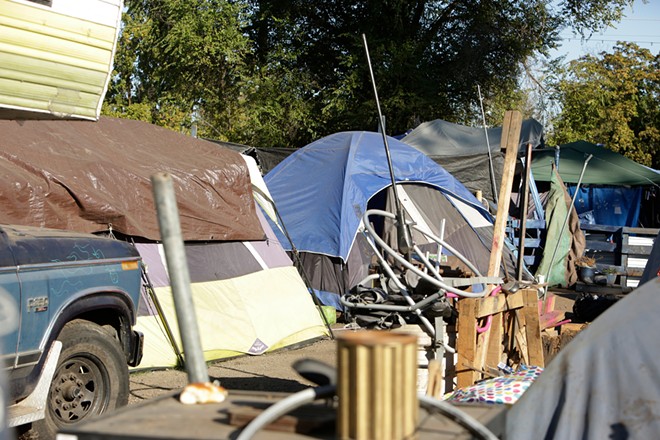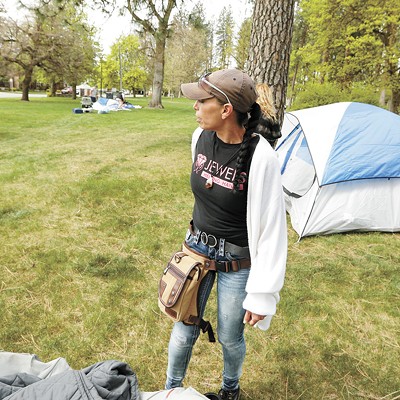The East Central Spokane homeless encampment known as Camp Hope has shrunk considerably since it moved to the neighborhood a year ago. But while many campers have moved elsewhere, the money is still flowing.
It's unclear how much money has been, or will be, spent. From what we've gathered for this article alone, the tally so far is more than $36 million. (That's money that's been spent or allocated for services at the camp itself, or to shelters.)
But this is not a comprehensive list. There are some contracts we didn't include, and in some cases, the people putting money toward the camp wouldn't say how much they're spending.
For instance, the Smith-Barbieri Progressive Fund is currently funding a lawsuit to stop local law enforcement from clearing the camp. Lerria Schuh, the fund's executive director, declined to say how much the organization is paying toward the lawsuit. (Schuh also says the Smith-Barbieri organization isn't financially supporting Jewels Helping Hands or any of the other service providers running the camp.)
Some other costs associated with the camp are hard to quantify. Doug Trudeau, who until recently was president of the East Spokane Business Association, argues that local businesses have been losing money because of a rise in crime and vandalism he associates with the camp. Local businesses have also spoken of a decline in customers, he says, adding that road construction in the area may also be playing a role.
On Monday, the City Council approved a $70,000 settlement with Cameron-Reilly LLC, a contracting company who said they faced vandalism and theft while working on road construction near Camp Hope.
$14 MILLION
FOR CATALYST PROJECT
As part of Gov. Jay Inslee's Rights of Way initiative, which aims to help people living on state land move to better living conditions, Spokane is receiving $24 million from the state Department of Commerce (see breakdown above).
The biggest chunk of that money has gone toward the Catalyst Project — a former Quality Inn in the West Hills that's been converted into a housing project with space for 100 people. The state put $9 million toward buying and renovating the former motel, and $4.7 million for a contract with Catholic Charities Spokane to operate the shelter. The rest of the $24 million is going toward other local shelters and services for homeless people.
$1.48 MILLION
FOR JEWELS
As part of the same $24 million state initiative, the commerce department allocated $3.47 million to the Empire Health Foundation to subcontract with various service providers at Camp Hope. Of that money, Jewels Helping Hands — a nonprofit that's been managing the camp since its inception as a protest outside City Hall in 2018 — is receiving $1.48 million.
Julie Garcia, executive director of Jewels, says all of the nonprofit's work at Camp Hope is funded by its contract with the Empire Health Foundation, which is also subcontracting with Revive Counseling Spokane, Compassionate Addiction Treatment and the Spokane Low Income Housing Consortium.
Tax records indicate that Garcia was paid $35,671 for her work with Jewels in 2020, and $25,600 for her work in 2021. Jason Green, Garcia's husband and the treasurer for Jewels, says that a 2020 tax filing reporting that $565,032 — 64 percent of the nonprofit's revenue that year — had gone to "executive compensation" was done in error. He thanked the Inlander for bringing it to his attention, and says he's filing an addendum to correct it. The total for Garcia and the other two board members who received compensation in 2020 was $62,184, Green says.
$26,100
IN RENT
The city of Spokane has touted the recently opened Trent Resource and Assistance Center as a key part of its plan to close Camp Hope. The shelter is in an industrial warehouse owned by local developer Larry Stone, who purchased the building last spring for $3.5 million. In total, the lease is expected to cost at least $1.6 million over a five-year term. The city is paying Stone $26,100 a month for use of the building as a shelter. The city is also paying Stone's property taxes, maintenance and a management fee of 2.5 percent of the base rent. Stone did not respond to requests for comment.
The building's lease agreement stipulates that Stone make improvements to the building at his own expense. The county has also invested $500,000 in upgrades to the building. The state has put $2 million toward the shelter as part of Inslee's Rights of Way initiative.
The shelter is being operated by the Salvation Army, which has a $5.5 million contract with the city to operate the shelter through the end of 2023. Revive Counseling Spokane, which provides mental health services at the shelter, is getting $1.6 million from the city for its work at the shelter through 2023.
$1.1 MILLION
ON SECURITY
There are four separate entities working to provide security at or adjacent to Camp Hope. Between March and November, the city paid $238,640 to private security company Crowd Management Services to patrol outside the camp. During that same time period, the city also spent $401,899 for police overtime to patrol outside the camp. (Police generally make time-and-a-half pay while working overtime.)
When you include garbage removal, that brings the city's total spending at Camp Hope to more than $720,000 between March and November of last year. Brian Coddington, the mayor's spokesperson, said he doesn't have numbers from December yet. Coddington says the city still wants the state to reimburse it for those expenses. The state has said it won't do that.
The Washington state Department of Transportation, which owns the land Camp Hope occupies, is paying for private security of its own at the camp. Since September, the state agency has paid Security Services Northwest $317,585.
WSDOT has also been paying for diesel, generators, porta-potties, fencing, propane heaters and other minor amenities at Camp Hope. Between September and December, the state agency spent $7,100 removing 24 tons of debris from the camp. The money WSDOT is spending comes out of the North Spokane Corridor property management budget.
The last security entity is a small team employed by Jewels. The team is primarily composed of current and former Camp Hope residents. Green says they've paid $155,421 for the security team since August, when Jewels first started contracting with Empire Health Foundation. Before then, he estimates they spent $14,000 on security at the camp. ♦


























